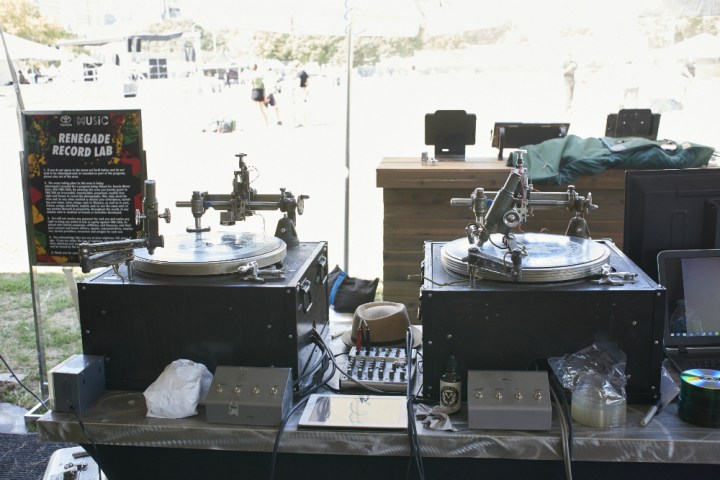
The live hand-cutting process was handled by Mobile Vinyl Recorders (MVR), a company that for six years has been making vinyl records out of used CDs from more than 600 artists including The Flaming Lips and Jamie xx. MVR is a partnership between two Seattle sound engineers, Michael Dixon and Kris Dorr, both of whom donned white lab coats as the pair turned CD singles from Sir The Baptist and Benjamin Booker into playable vinyl in front of inquisitive spectators. Under the Toyota Music tent, MVR’s vinyl cutting was one of four installations, but it was the only one where people could spectate without actually entering the tent.
Dixon told Digital Trends that, similar to the vinyl mass production done traditionally in record plants, the mobile version MVR displayed at Afropunk involved cutting a master disc from the original recording using vintage Presto 6N lathes, which have not been manufactured since the 1940s. Whereas a traditional record press would take that master, usually a vinyl-coated piece of aluminum known as an acetate, and make a larger mold out of it, MVR quits while it’s ahead. “We do the first step of that process over and over again,” Dixon explained. “In this case, we’re actually cutting on used CDs and turning used CDs into playable vinyl.”
“In the case of music festivals, it is a much younger demographic, so in that sense we are trying to target a younger target,” Tyler McBride, Toyota’s engagement marketing manager, told Digital Trends. “But the primary goal is to appeal to a mindset.”
That mindset is one characterized by identifying with music — for example, someone who proudly parades around the cover of their favorite album on a shirt, which was a popular fashion choice at this year’s Afropunk festival. “For a certain subset of people, that’s part of their identity, their record collection,” Dixon said. “Having a big record collection or whatever it is you collect, that tells people what your interests are and what kind of person you are.”
There may have been an abundance of music aficionados at Afropunk, but the interest was noticeably tempered. There were no lines of people waiting to pick up freshly pressed vinyl, just transitory pockets of briefly engaged concertgoers who more often than not left the station empty-handed once their inquiry was satisfied. “It really confuses them,” Dixon said. “It takes several times of explaining what it is, Even though they see these big, weird turntables, and we can tell them we’re making CDs into records, they’re like ‘It’s a CD, right?’ No, it wont play as a CD anymore. Now it plays on your turntable as a vinyl record.”
Similar to virtual reality, if you do not have the right equipment, this is just a pretty novelty. “They won’t play on automatic turntables because they’re so small, your turntable thinks the record is over and lifts up.” The only turntable decks that would play these vinyls are manual turntables and DJ-style turntables such as the Pioneer CDJ serie,s which allows C’s to be played on turntables. With MVR already in Chicago at the Pitchfork Music Festival last month, do not be surprised if you start carrying CDs to your next music festival outing.


